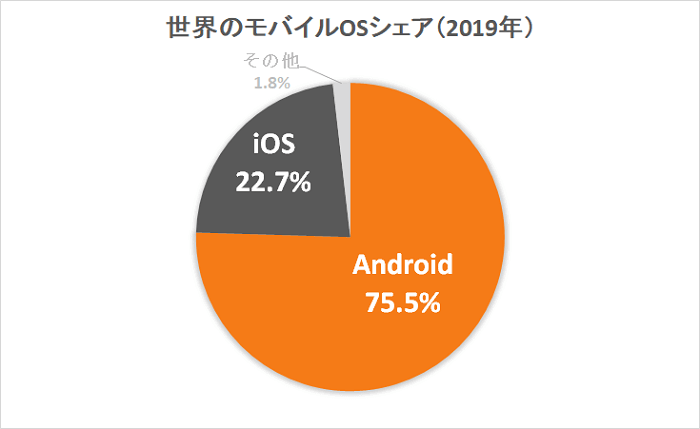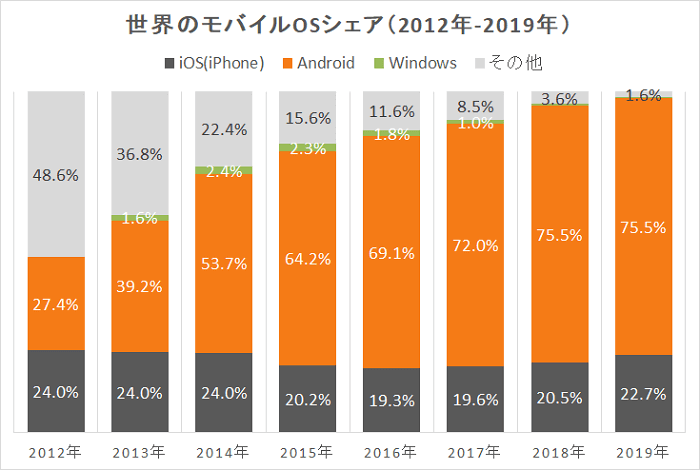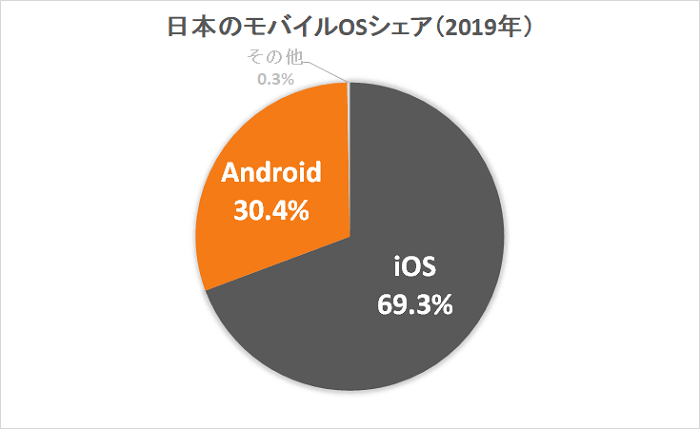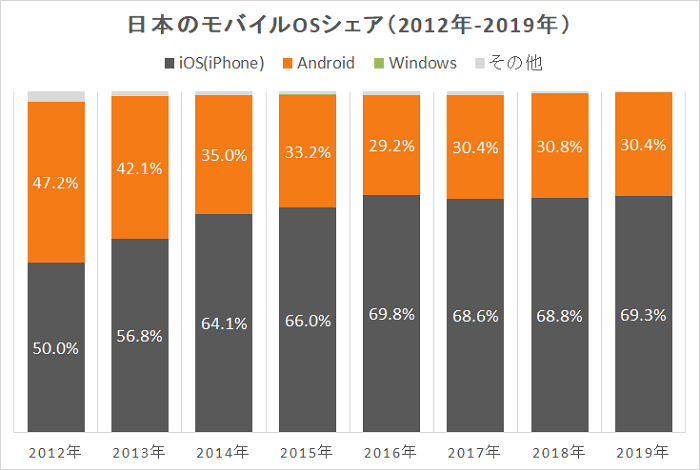When going to Japan, it is very easy to notice the amount of people using iPhones around. However, a recent article from Fumiko Kuribayashi, published in Asahi Shinbun on October 10, 2018, announced that Google would try to catch up on Apple with its new smartphone, named “Pixel 3”. Based on this, we can wonder if it is actually possible for Google to surpass Apple, or at least to significantly increase their market share in this country.

The global smartphone market is dominated by Android phones, as it can be seen in the graph above, which shows the global share of various mobile operating systems on the smartphone market. Google's “Android” has the largest share, and Apple's “iOS” only has 19.6% of the market.

When we look at the evolution of the market share starting from 2012 with this second graph, it becomes clear that Google is the global market leader. We can see that Apple's share has been decreasing, from 24% in 2012 to 19.6% in 2017, while Google's share keeps increasing.
In Japan, however, the situation is utterly different.

This graph represents the share on the Japanese smartphone market. The situation there is almost the perfect opposite of the global market. Google's share represents 30,4% of the market while Apple's share represents a larger 68,6%. Other operating systems hold an even smaller share of only 1%.

If we look at the evolution of the market share in Japan, we can see that here too, it has nothing in common with that of the global market share. Both companies had a similar share in 2012, but after that, Google's share dropped every year, while Apple's share increased by 18,6% in total.
There are several reasons explaining why the Japanese market and the global market are so different, first of which is the way both companies entered the country. Apple started selling the iPhone in 2007, and it entered the Japanese market in 2008 – one year later. At that time, the iPhone was an innovative product, because it was both a phone and an iPod at the same time, and because it had a high number of “new” features e.g. a touch screen. However, phone operators in Japan did not immediately show an interest in the iPhone. Consequently, Softbank was the only one selling it at the start. It had an overwhelming success, and other operators, including KDDI and NTT Docomo, started selling it as well. This way, Apple was able to spread the iPhone on the Japanese market. As for Google, it entered this market way sooner, in 2001, which is 7 years earlier than Apple. But Japanese consumers were not interested in Google at that time. Moreover, Google only launched their operating system, Android, in Japan in 2009. This means that Apple was, in the end, one year early, which gave them an advantage.
But that is not the only reason for Apple's success in Japan. Japanese consumers tend to prefer iPhones to other smartphones, first, because they find their design simple and yet attractive, but also because they think that the balance between functions and performance is good. Besides, there are a lot more accessories available for iPhones than for other smartphones, which makes customization easier. Iphones also have more apps, which makes them attractive for younger people, and finally, the fact that everyone owns one is also a factor – if there is an issue, for example, if someone forgets their charger at home, they can always ask someone at work or at school for their charger and solve the problem quickly.
In the end, we can say that Apple's success in Japan did not happen by chance – the company made sure to stay attractive in the eyes of Japanese consumers, and was able to stay the leader on this market by using its many assets. Currently, Japan is Apple's biggest market in terms of share.
DUCOURTIOUX A.
DUCOURTIOUX A.
Hi Ambre,
ReplyDeletethank you for your article. It was intersting to learn more about the implementation strategies of Apple and Google in Japan. But do you really think the new Pixel 3 from Google will be able to compete with the newest iPhone on the market? I've heard Pixel 3 is slower than an iPhone and Pixel 2 had recieved bad reviews about the display and its performance. As Apple has already the biggest share on the Japanese market, I am wondering how Google will try to catch up with Apple.
Melanie K.
Hi Melanie,
DeleteThank you for your comment.
In my opinion, it is unlikely that Google will outperform Apple on the Japanese market, because Apple has a lot of assets there. Japanese people particularly like their phones, for the various reasons which I have described in the article. Moreover, the Pixel 3's main selling point is its camera, but I personnally do not think it will be sufficient to beat Apple, or even to equal them, especially if, as you say, the Pixel 3's performance is worse than the iPhone's.
Ambre D.
Hi Ambre,
ReplyDeleteThanks for your article, I did not know that Apple had such a big market share in Japan.
Do you think that the iPhone's popularity is due to the social image it conveys? As it is expensive and made with sleek metal materials, is the image the most important aspect ?
Also, do you think that Google can really overtake Apple in terms of market shares?
Harry B
ghf
ReplyDelete